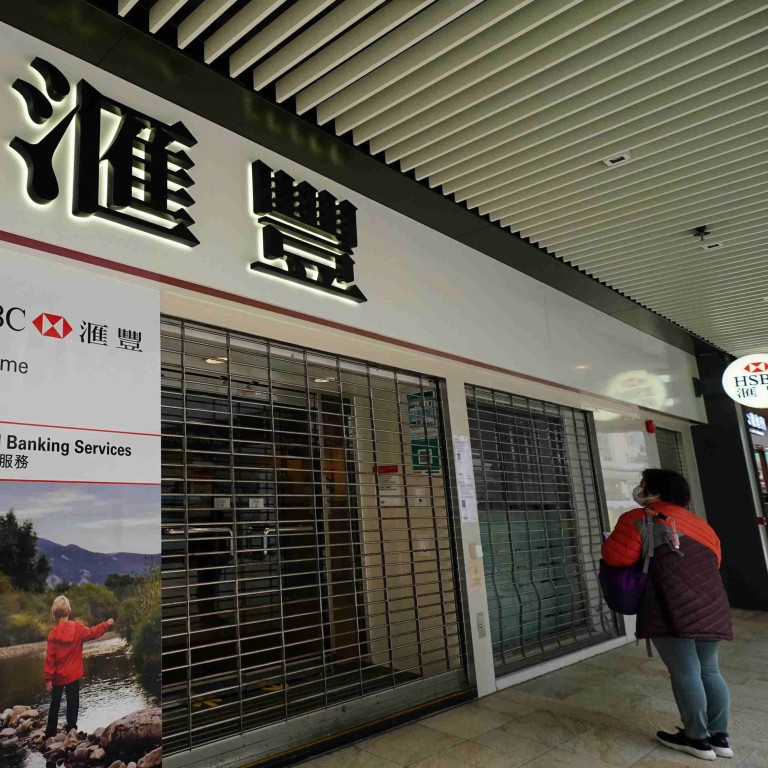
HSBC’s first-quarter profit drops 28 per cent as uncertain markets hit wealth revenue, but the bank beats a consensus profit estimate
- Pre-tax profit was US$4.2 billion, beating a consensus estimate of US$3.72 billion
- Operating income in its wealth business fell 19 per cent in the quarter, driven by weakness in Hong Kong
The bank’s net profit declined to US$2.8 billion in the three months ended in March, from US$3.9 billion in the same quarter of 2021.
On a pre-tax basis, the London-based bank reported a profit of US$4.2 billion, above a consensus analyst estimate of US$3.72 billion compiled by the bank.

The prior year’s quarter included a release of US$400 million in expected credit losses (ECL), compared with US$600 million in reserves taken for potential soured loans in this year’s first quarter.
The ECL provision in the quarter included US$250 million related to HSBC’s Russia exposure and US$160 million related to its Chinese commercial real estate loan portfolio.
Operating income in HSBC’s wealth business fell 19 per cent in the quarter, driven by weakness in Hong Kong. Pre-tax profit in its Wealth and Personal Banking segment declined 37 per cent to US$1.16 billion in the quarter.
HSBC, Standard Chartered forecast to show lower profits. Can they surprise?
Russia’s invasion of Ukraine in late February has sparked significant market volatility and driven up food and commodity prices globally in recent weeks.
The bank said it was complying with sanctions on Russia and its Russian operation, which mostly supports multinational companies, is not taking new business or customers and is “consequently on a declining trend”.
Shares of HSBC dropped 4.2 per cent to close at HK$49.50 on Tuesday in Hong Kong following the announcement.
The bank said that it completed a US$2 billion share buy-back first announced in the third quarter and expects to undertake a previously announced US$1 billion buy-back next week following its annual meeting on Friday.
Additional share buy-backs are unlikely this year as the bank focuses on providing dividends to investors, according to Ewen Stevenson, HSBC’s chief financial officer.
Revenue declined by 4.5 per cent to US$12.5 billion in the first quarter, while net interest income rose by 7.7 per cent to US$7 billion in the period.
Net interest margin (NIM), an important measure of profitability, rose five basis points to 1.26 per cent, compared with 1.21 per cent in last year’s first quarter. It was 1.22 per cent in the fourth quarter.
Pre-tax profit fell by 46 per cent to US$1.02 billion in the first quarter in Hong Kong, the bank’s biggest market. Overall, pre-tax profit in its Asian business declined 26 per cent to US$2.8 billion in the quarter.
HSBC saw as many as half of its branches closed in Hong Kong at various points during the first quarter, which affected wealth and “complex product sales” typically conducted through its branches, Stevenson said. He noted that mutual fund sales were down 30 per cent in the quarter.
“When you look forward, the branches, as I understand, are largely reopened for us in Hong Kong,” Stevenson said on a call with journalists. “Therefore, we would expect wealth revenues to normalise very rapidly. Having said that, Q1 is typically the strongest quarter for us. We do expect normalisation over the next three quarters, but net-net, because of the weak first quarter, it will have an impact on full-year wealth performance this year.”
After showing signs of recovery last year, the city’s economy was hit hard in the quarter by the fifth wave of Covid-19 cases. Hong Kong’s economic growth rate is expected to slow to 2.8 per cent this year, compared with 6.4 per cent in 2021, according to Moody’s Investors Service.
“HSBC reported a modest earnings beat vs. consensus today on better provisions and costs,” Jefferies analyst Sam Wong said in a research note. “Hong Kong operations saw modest NIM expansion, weaker [non-interest income] and some normalisation of credit costs.”
In HSBC’s global banking and markets segment, pre-tax profit fell by 33.8 per cent to US$1.21 billion in the first quarter. The commercial bank reported a pre-tax profit of US$1.79 billion in the first quarter, compared with US$1.82 billion a year earlier.

